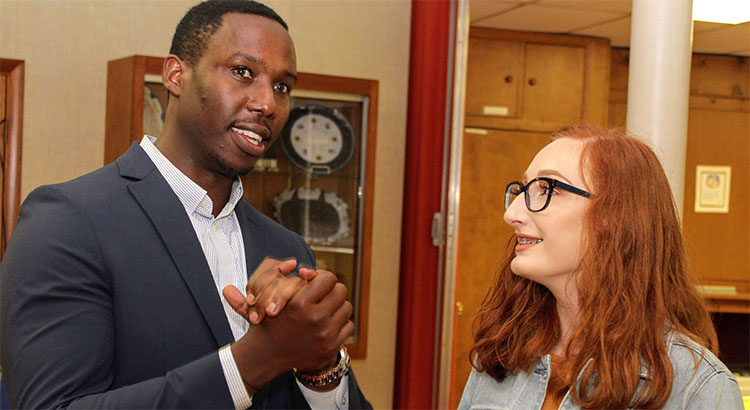As mounting instances of identity-based violence arouse memories of historic, mass atrocities, alarmed communities across the U.S. increasingly counter with public vigils and calls for peaceful resolution to conflict.
Here in Terre Haute, UHC’s sanctuary provides a welcoming venue for such events. On April 7, the 25th anniversary of the day Rwanda’s Hutu majority unleashed a genocide that took the lives of 800,000 people, mostly of the Tutsi minority, UHC welcomed survivor Emmanuel Habimana and the Terre Haute South Vigo High School STAND club to present a special program entitled #TogetherWeRemember.
Documentary tells the story of orphan survivors
Habimana recently graduated from film school in Los Angeles and has co-directed Komora: To Heal, a documentary about the orphan survivors of Rwandan genocide. He has visited Auschwitz with Holocaust Museum and Education Center founder Eva Kor, and recently moved to Madison, Wis., at the invitation of former CANDLES executive director Kiel Majewski, who now operates a Madison-based consultancy for non-profits, Timberwolf Advisors.
Before introducing Habimana to the audience at UHC, Majewski spoke about strategies we all can use to defuse hate speech.
Kiel Majewski: ‘These things are not OK’
“Each of us in our own little sphere of influence can speak out and say, ‘these things are not OK; I do not agree with this.’ Elie Wiesel said, ‘Wherever men and women are persecuted because of their race, religion and political views, that place must at that moment become the center of the universe.’
“The idea is to make ‘Never Again’ mean something in your community.”
“A few weeks ago, Christchurch was the center of the universe. A couple of months before that, Pittsburgh was the center of the universe. The idea is to make ‘Never Again’ mean something in your community.”
Rwanda serves as an example in its recovery
The soft-spoken Habimana, 34, sat on the bimah for a question-and-answer session with STAND members. He said he’s encouraged by Rwanda’s continuing recovery from its horrific past.
“I think the important lesson of Rwanda is the progress that one can make. The new government has put in place [institutions] removing segregation and Rwandans and the survivors in general have made themselves to be the examples.
“I think the lesson from Rwanda is the [importance of] the Resistance, the need for respect and to create a space where each and everyone can have a sense of freedom.”
“There are so many things to learn from Rwanda. The resilience…. It’s kind of scary because around the world where people endure discrimination, as Kiel would say, it is ‘us vs them.’ It makes us a little bit worried that maybe [these conditions] will lead to genocide — hopefully not.
“But I think the lesson from Rwanda is the [importance of] the Resistance, the need for respect and to create a space where each and everyone can have a sense of freedom.”
“Hands” – A Song for Orlando
The Terre Haute South STAND club closes the program with a a song dedicated to the victims of the Pulse Nightclub shooting.
Emmanuel Habimana talks about his work
“It’s called Project Forgiveness — a comparative concept of forgiveness from different kinds of countries that have experienced genocide or mass atrocities. We just covered Rwanda; we’re moving to Bosnia.
“I’ve seen [how] forgiveness has brought peace in Rwanda and I’m curious to see what is happening in other countries that have [experienced] genocide as well. I think it’s very interesting to see how people move in the aftermath of mass atrocities and genocides.”
Photos
Scott Skillman informally greeted the audience and Kiel Majewski offered strategies on strengthening community resistence to violent hatred.
STAND members interviewed Emmanuel Habimana about his experience surviving the 1994 genocide against the Tutsi minority in Rwanda.
Students recited the names of victims lost to hate-based violence and delivered poems by Andrea Gibson and L.R. Knost.
Audience members paid close attention to the program.
The UHC sanctuary is a gathering place for meaningful community events.
Students closed with Hands, a song dedicated to victims of the Pulse nightclub shooting in Orlando, Fla.
Everyone gathered for photos on the bimah.
Afterward, guests mingled and enjoyed refreshments in the Vestry Room.



































































































